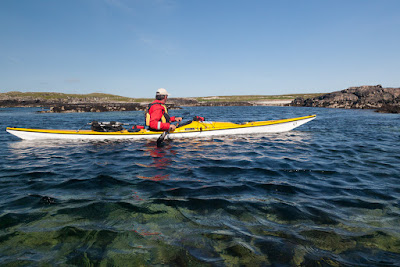Tony and Gavin were on a camping trip round Bute and had arrived at Glencallum Bay at 10pm the previous night. We hoped to meet them at Garroch Head.
This was Jim's first outing (in home waters) of his new Rockpool Taran. A gusty NW wind slowed our crossing and...
...by the time we rounded Garroch Head and landed at Dunagoil Bay, we had missed Tony and Gavin.
After a quick luncheon spent admiring Jim's paint job...
...we departed from Dunagoil as heavy clouds rolled in, obscuring the Arran mountains.
We soon passed Dunstrone, which like Dunagoil, has an Iron Age hill fort on its summit.
We left Dunagoil and Dunstrone on the horizon behind us and landed at Scalpsie Bay, where we eventually caught up with...
























































